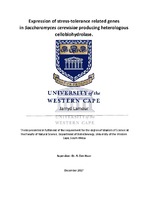| dc.contributor.advisor | Den Haan, R. | |
| dc.contributor.author | Lamour, Jarryd | |
| dc.date.accessioned | 2018-04-06T08:19:04Z | |
| dc.date.available | 2018-04-06T08:19:04Z | |
| dc.date.issued | 2017 | |
| dc.identifier.uri | http://hdl.handle.net/11394/5885 | |
| dc.description | Magister Scientiae - MSc (Biotechnology) | |
| dc.description.abstract | Cellulose is the most abundant naturally occurring renewable biopolymer on earth and a
major structural component in plant cell walls, making it an ideal source of renewable energy.
Consolidated bioprocessing (CBP) is a cost effective method of converting cellulose to liquid
fuels such as ethanol. For CBP to be achieved an organism needs to be able hydrolyze cellulose
and produce high yields of ethanol. The yeast Saccharomyces cerevisiae is an ideal CBP
candidate, however wild type strains do not produce cellulases and these activities need to
be engineered into yeast. In addition, the generally low secretion titers achieved by this yeast
will have to be overcome. | |
| dc.language.iso | en | |
| dc.publisher | University of the Western Cape | |
| dc.title | Expression of stress-tolerance related genes in Saccharomyces cerevisiae producing heterologous cellobiohydrolase. | |
| dc.rights.holder | University of the Western Cape | |

